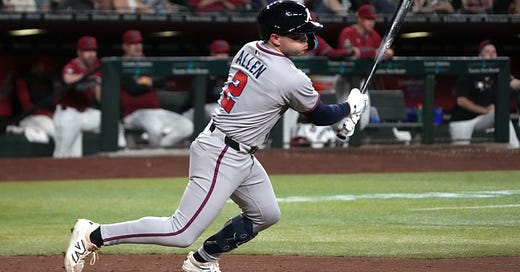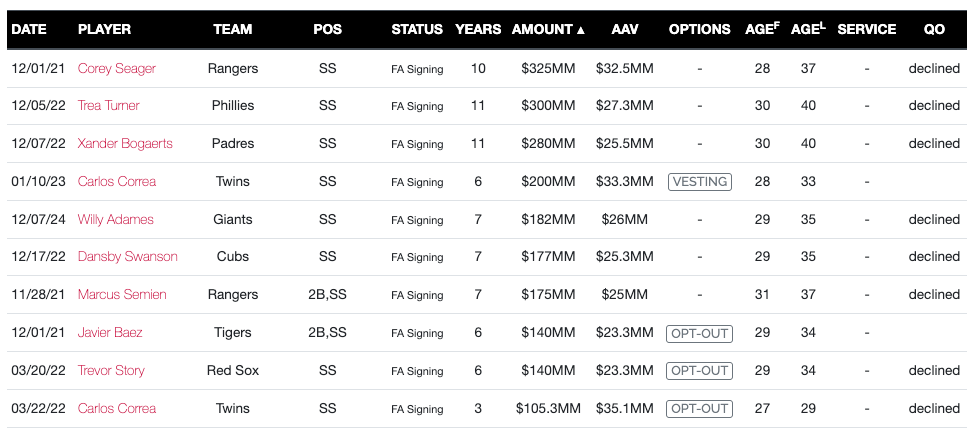Is there any way to fix Atlanta's black holes on offense?
One-third of the lineup is currently at the bottom of the leaderboards in offensive production
I was dealing with writer’s block on Tuesday evening and couldn’t really figure out a newsletter topic for today.
And then, during the rain delay, David O’Brien of The Athletic put out the following tweets:
That’s right, one-third of Atlanta’s everyday lineup are among the fifteen worst players in baseball as sorted by OPS. As of gametime on Tuesday, there were 161 players qualified for the leaderboards (3.1 PAs per team game), so being in the bottom fifteen represents the worst 10% of hitters in baseball.
And the Braves have three everyday starters down there, with left field not father behind (although Jurickson Profar’s on his way back and he might be the answer.)
What hope does Atlanta have of fixing these guys? Let’s talk about it.
There aren’t many options at shortstop
By far, Nick Allen’s the hardest of these three to replace. It’s not for the caliber of his bat, either - it’s purely a supply and demand thing here.
Per MLB.com, here’s a look at this offseason’s expected free agent class:
Shortstop: Bo Bichette, Trevor Story (opt-out), Ha-Seong Kim (opt-out), Orlando Arcia (
club option), Miguel Rojas, Isiah Kiner-Falefa, Amed Rosario, Paul DeJong
And believe it or not, this is optimistic versus what’s actually going to happen.
If Story opts out of his deal with the Boston Red Sox, he’ll need to clear 2/$55M - his two guaranteed years at $25M plus the $5M buyout on his 2028 club option, also priced at $25M. You tell me, is an almost 33-year-old who is hitting .232 and carrying both a 29.7% strikeout rate and a -2 OAA getting that much in free agency? The answer to this rhetorical question is no, not if that GM wants to keep his job.
On the same vein, Ha-Seong Kim has yet to debut for the Tampa Bay Rays after his 2024 season ended early for shoulder surgery. He’s been on rehab for about three weeks, but is hitting just .211 for Triple-A Durham and was removed from his rehab stint late last week for hamstring tightness. He’s getting paid $13M this season and has a player-option for $16M next season, another decision that feels like a certainty to get picked up.
That leaves Bo Bichette and a motley crew of assorted veteran backups and castoffs.
There’s a reason that so many players who can both hit and defend have gotten a bag in free agency at shortstop in recent years. Per the MLB Trade Rumors contract database, ten different shortstops have gotten free agent deals of $100M or more in the last four offseasons, including four over $200M and two over $300M.
(The above chart doesn’t factor in the extension given to Bobby Witt Jr., valued at 11 years and $288.8M.)
Every deal in the group received and declined a qualifying offer, except for Javier Báez and Carlos Correa’s follow-up contract, both of which were ineligible. Those declined qualifying offers trigger additional compensation from the signing team - the forfeiture of a draft pick somewhere between the 2nd and 4th rounds, depending on luxury tax status and revenue sharing eligibility, as well as loss of some of the team’s international free agency bonus pool in the next signing period.
Is it possible the Braves were resetting their luxury tax obligations this season to make a run at a qualifying offer player? It’s possible, although I always imagined it’d be one of the pitchers like Dylan Cease or Michael King instead of ‘shortstop’ Bo Bichette.1
No, Atlanta’s going to need to be more creative with how they fill this one. Nick Allen’s acquisition over the winter was a throwaway transaction that was so under the radar I don’t even think it got the “What the Atlanta Braves saw in Nick Allen” treatment from Braves Today.
And this, again, comes down to supply and demand, as well as the versatility of shortstop prospects if they need to move down the positional ladder.
Teams seldom trade top shortstop prospects - even if they can’t stick at the position, they can usually flex almost anywhere else on the diamond. Jordan Lawlar’s blocked in Arizona at his natural position, but he’s about to take over third after Eugenio “Grant Holmes’ worst nightmare” Suarez departs in free agency this offseason. Brooks Lee was blocked in Minnesota by Carlos Correa, but he’s played both second and third base this season, shifting to short when Correa’s been unavailable. Jackson Merrill was blocked at shortstop in San Diego by Fernando Tatis Jr. and then by Kim and Xander Bogaerts, so he just went out and became a Gold Glove-caliber centerfielder instead.
This one’s going to be interesting to track going forward, but it’s not really clear what Atlanta can actually do unless they decide to either take someone else’s bad contract, try and “fix” a slumping hitter, or attempt a position change of a top tier defensive second baseman with shortstop experience (Nico Hoerner, perhaps?).
(If it’s me and I’m attempting a position change, I’m calling up San Francisco and asking for Casey Schmitt in a deal. He was once viewed as the best defensive third baseman in the minors, has filled in at shortstop in the majors, and appears to me to be on the verge of a breakout with the bat.)
Ozzie’s replacement might already be in AAA
This was Monday’s newsletter, but Ozzie’s deteriorated in virtually every aspect over the last few seasons.
Luckily, top positional prospect Nacho Alvarez just returned from his rehab stint and was optioned to AAA Gwinnett. A failed shortstop conversion that will be sticking to 3rd and 2nd bases going forward, he’s my bet to get some reps at second base in the back half of the schedule.
When he’s at his best, he’s a high on-base bat with great contact skills and really good barrel control. He’s also not a great defender and looked entirely overmatched during his brief MLB debut last season, coming when Ozzie was out with an injury.
We’ll talk more about Ozzie and his fate once we have some clarity as to the possibility of this roster contending and whether or not they’ll be selling at the deadline.
Harris just needs to be better
Here’s the deal with Michael Harris: You can live with one of your two elite defenders not hitting, either your shortstop or your centerfielder, not both. And Harris has the better raw tools.
The good news is not only has Harris started to improve over the last few weeks - he’s hitting .255 over the last fifteen games and slugging .458 in the last seven - but he’s also a bit more fixable than Allen, as his primary issue is known at this point: His chase.
As we’ve discussed ad nauseam at this point, Harris chases more than virtually any player in baseball. And that’s really his fatal flaw - on pitches inside the strike zone, he’s hitting .296 with a .450 slug.
He just doesn’t swing enough at those pitches and swings too much at pitches out of the zone (40.2% chase rate, 2nd percentile). I legitimately don’t know why teams ever throw him more than one pitch per at-bat in the strike zone - he’s shown he’ll swing at will on pitches in both the chase and the shadow.
This one’s going to need to be fixed by the player, and it’s as simple as that. Again, he’s increased the speed of his swing and slightly dialed back the chase in recent weeks, so he’s starting to trend in the right direction. It’s just a matter of continuing to get better, preferably with some rapid jumps.
Do you have an idea of how to improve shortstop? Is there a specific player you’d target via trade? Let me know below and I’ll grade the deal on the next mailbag pod, coming on Friday as part of our weekly live show.
In seven seasons as the shortstop in Toronto, Bichette’s only twice finished positive in Outs Above Average at short and has a career mark of -17.






One of your best submissions of the season, especially with what you had to say concerning Albies and Harris.